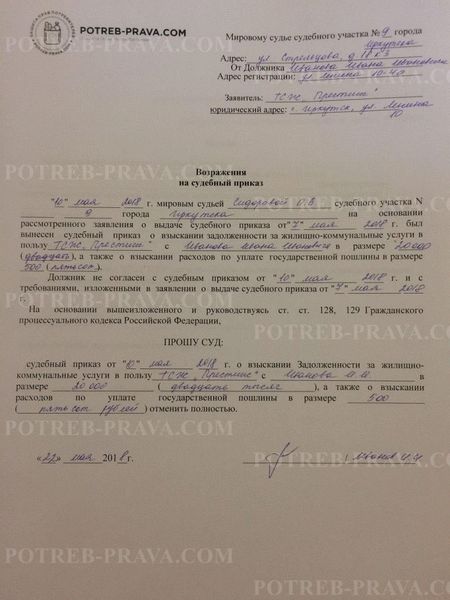Utility debt is a nuisance that anyone can face. Timely payment of receipts is the responsibility of the tenant or owner. If the terms of the contract are ignored by the owner or tenant, the law sides with the management company. The management company has the right to demand money with the help of a higher authority. It is possible to avoid debt repayment, since the law provides for the cancellation of a court order to collect debts for housing and communal services.
The procedure is often nervous and difficult - it is better to immediately seek advice from a lawyer. This will help to correctly determine the necessary actions to solve the problem, based on specific circumstances.
Explanation of the term “court order”
The document is mentioned in the Code of Civil Procedure of Russia. Based on Art. No. 121 – a court ruling has the force of an executive act.
Features of the order in litigation with housing and communal services:
- Availability of grounds - a statement from the management company with evidence of the validity of the claims in the form of attachments.
- The defendant in the claim is not invited, based on the irrefutability of the plaintiff’s claims. The logic is there - there are no fees for utility services, which is already a violation. The debtor's opinion is not taken into account here.
- According to the issued order, you can recover no more than half a million rubles of debt.
A court order for housing and communal services debts has several functions:
- decisions on a claim - issuance means recognition of the rightness of the plaintiff-creditor;
- executive – sufficient to begin the process of paying off debts;
- grounds for initiating enforcement proceedings.
The speed of processing an application is the main danger for those who, for some reason, are really not aware of the existence of unpaid utilities. The first alarm bell may be receiving a copy of the decision by mail (the duty of the magistrate - Article 128 of the Code of Civil Procedure of Russia).
In this case, the situation has already been resolved in favor of the Criminal Code. After canceling the court order to collect the debt for housing and communal services, it is allowed only within a certain period of time - 10 days (Article 129 of the Code of Civil Procedure). The request for cancellation must be justified.
What is a court order?
A court order is a court order issued upon the written request of the applicant to forcefully collect a debt. A court order ensures the fulfillment of an indisputable claim based on indisputable documentary evidence of the fact of the debt. The court issues a court order only for the types of requirements strictly defined by the Civil Code of the Russian Federation. These include:
- Requirements for transactions concluded in simple written form (for example, in case of debt on loans) and for notarized transactions, as well as court orders for the collection of debts for utilities.
- A court order for the collection of alimony.
- Claim for unpaid wages.
- Application from the tax authorities for the collection of debts on taxes and fees.
- Requests from internal affairs bodies for the collection of expenses related to the search for the defendant (debtor, etc.).
Since the order is made on the basis of undisputed documents, there is no subject matter for a standard trial. Therefore, consideration of the application and drawing up of the court order takes place without the presence of the parties, according to a “simplified” procedure of legal proceedings.
Contents of the court order
The court order contains the following information:
- name of the court;
- production number;
- date of the order;
- Full name of the judge who issued the order;
- personal data of the claimant;
- details and address of the debtor's location, place of work (if known);
- references to normative and legislative acts that are the basis for satisfying the requirements and issuing an order;
- the amount of amounts to be recovered;
- the amount of the penalty (if provided);
- applicant's bank account details.
How long does it take to issue a court order?
The deadline for issuing a court order is 5 days from the date of filing an application for a court order. the order has the force of an executive document, therefore, from the moment it comes into force, the claimant has the right to apply to the bailiff service for its execution.
This is important to know: Suspension of enforcement proceedings for alimony at the request of the claimant
Grounds for appeal
It is desirable that the factors for appealing the court order really exist, otherwise it will be problematic to meet the deadline. Usually one or more possible options are selected.
Disagreement with the amount
The most popular solution. Sometimes the Criminal Code mistakenly indicates the amount to be paid. In some situations, it is unlawful to charge fines and penalties. If the funds specified in the order do not coincide with one’s own vision of the state of the personal account, the decision must be challenged.
To do this, you must have receipts on hand. Experts recommend putting them in a separate folder from the very beginning so that you can present data for several years at once. The more information you can collect, the more justified your position.
This is important to know: Statement of claim for recalculation of utility bills: sample
Postponement
Sometimes it is not possible to repay the debt within the deadlines established by the management company, and then by the court, for good reasons. They may be the lack of registration in the region, serious illness or other unforeseen factors.
It is better to check with a lawyer about the possibility of a deferment for each case. A legal specialist will tell you what documents need to be prepared for a response to the court.
Limitation of actions
Usually, an attempt to collect old debt is a tool of unscrupulous management companies and homeowners associations. Often such lawsuits are filed to close holes in an organization's budget. A characteristic feature is that before contacting a higher authority, employees of the management company for a long time, in a persistent and aggressive manner, convince the citizen that he is obliged to pay all the arrears, threaten to turn off public services, and so on.
However, no one has canceled the limits of the claim period. When receiving a court verdict regarding old debts, you can safely appeal to this concept. According to clause 1 of Article 196 of the Civil Code of the Russian Federation, the period is three years.
Usually, as a result of consideration of an appeal from a consumer utility, the debt is frozen. They will not be able to collect it, but only until the first violation of the payment procedure. The next time you miss it, the amount will be added to the amount of the new debt. Therefore, it is better to solve the problem of the unpaid balance, request a recalculation or gradually pay off.
Order form
The executive act is drawn up in the form specified in Art. No. 124 Code of Civil Procedure of Russia. If the received copy does not correspond to them, then the decision can be successfully challenged. Most likely, this will only work once, because a simple mistake in drawing up an order will not help the debtor.
The creditor has the right to appeal again to a higher authority. At the same time, the likelihood that the verdict will again be drawn up incorrectly is minimal.
Consequences of the entry into force of a court decision
The management company must also provide justification for issuing the document.
However, it is easier for the creditor to do this, since a statement is sufficient, which indicates:
- name of the court;
- information about the organization;
- debtor data;
- history of the debt and its relevance - attached documents;
- an agreement with a housing and communal services company, which allows you to demand payment.
If doubts arise regarding the license to operate a management company, the court may return the application, in accordance with Art. 125 Code of Civil Procedure of Russia.
If all the necessary papers are available, then a fairly small number of receipts for the latest billing periods. The court order is issued in 2 copies. The first is handed over to the plaintiff, a copy is sent to the debtor in the form of a notice. The second one is certified by the official seal and sent to the local bailiff department.
Don't understand the article or need help? Ask our in-house lawyer a question through the Online Consultant form or leave a comment. We will definitely answer!Ask a question >>>
Execution of measures involves full collection of debt. A court order alone, if it is not challenged in a timely manner, is enough to authorize bailiffs to carry out a list of restrictive actions.
Note: if you miss the 10-day deadline, even the situation of a low-income parent or a parent with many children will not help.
Algorithm of actions for challenging
The easiest way is to pay off the debt. However, it is only suitable for situations where a situation arose due to the user’s carelessness. In other cases, the court's decision should be challenged.
You must act immediately upon receiving a copy of the order. From this moment, a countdown of 10 days is initiated, after which it will not be possible to change the situation in your favor.
If it is impossible to appeal the decision during this period, then there must be valid circumstances:
- long business trip;
- being in a medical facility;
- other reasons.
The highest authorities must be notified about this. If there is evidence, the period has the right to be extended.
An application is being drawn up to cancel the court order to collect housing and communal services debt. The appeal should be submitted to the higher authority that made the previous decision.
You can deliver documents to the office:
- on one's own;
- through a representative authorized by a power of attorney;
- by registered mail - a less preferable option, since it takes longer and there is a risk of losing the postal item.
As a result, the court order will be terminated - the bailiff service will not be able to describe the property or close accounts. In the eyes of the law, from this moment a controversial situation is formed - in addition to the previously unconditional position of the management company, the opinion of the other side appears.
For your information: you can find a notice in the box about the start of enforcement proceedings. If a copy was not received earlier, then you must immediately apply for a stay of collection. Usually in such situations the bailiffs agree with the applicant.
Immediately after submitting the application, it is worth preparing an evidence base - checks, receipts, certificates. They will be needed in the next step. After the order is canceled, the manager will file a second claim, which will be considered during standard litigation. In the process, you will have the opportunity to prove your case, but only if there are grounds for this.
To achieve a decision in favor of the debtor, you need to:
- submit your application on time;
- give compelling reasons;
- do not make mistakes when forming papers.
The last point often causes problems due to the rush in which the appeal is prepared.
Rules for drawing up an application for cancellation
Despite the lack of strict frameworks, it is worth adhering to the drafting recommendations.
The text of the application must indicate:
- Header with information about the applicant and the authority. You need to fill out your passport and contact information. The letter should be addressed to the magistrate who decided to issue the order.
- Link to the resolution - details, date of issue.
- A text detailing the reasons, entitled “Objection.”
- The requirement to accept a document for analysis, with the signature of the citizen and the date of application.
The magistrate reviews the application within 10 working days and makes a decision. If it is drawn up correctly, then the order will be canceled due to the citizen’s disagreement (Article 129 of the Code of Civil Procedure of Russia).
To avoid mistakes, it is better to draw up an application for cancellation of a court order for the collection of housing and communal services debt according to the sample.
Note: the parties in the document must be referred to strictly as “debtor” and “collector”. Otherwise, the application may be rejected due to non-compliance with the form.
Preparing an objection
Further events develop differently. The emergence of a controversial issue does not oblige the magistrate to begin legal proceedings. The management company will be notified of the termination of the collection procedure. After which the service organization has the right to file a second claim. The result is a standard court hearing with the participation of the defaulter and a representative of the manager.
The initiative can also come from the debtor. If he disagrees with the claims of the housing and communal services, he has the right to write an objection to the court order to collect debts for housing and communal services.
This is important to know: Documents for subsidies for utility bills
Don't understand the article or need help? Ask our in-house lawyer a question through the Online Consultant form or leave a comment. We will definitely answer!Ask a question >>>
Thus, the very fact of a claim against a citizen is protested. If the outcome is positive, debts may be written off or a repayment procedure may be established.
It is important to have time to collect a package of papers and evidence. After receiving notice of the order and preparing to cancel it, there are about three weeks left to collect them.
Required documentation and deadlines for submission
An application with relevant attachments must be submitted within ten days from the receipt of a copy of the order, or within the extension period established by the court.
The list of required documents should include:
- objection to the statement of claim for the collection of debt for housing and communal services;
- receipts, checks, extracts as proof of correctness;
- documents, forms confirming the impossibility of timely payment;
- power of attorney, if the papers are transferred by a third party.
The review takes place within 10 days, after which the court remains to make a decision and notify the applicant.
Court orders for the collection of housing and utility payments in questions and answers
This type of solution has its own characteristics. It is published in a matter of days without inviting the creditor and the debtor into the courtroom.
The Code of Civil Procedure of the Russian Federation contains an exhaustive list of grounds under which it is possible for a magistrate to carry out writ proceedings. Possible reasons include the presence of utility debts.
At the same time, both payers for consumed services and utility services periodically have questions related to the issuance, review and execution of the will of the court. Here are just a few examples of advice provided by lawyers.
Is it possible to cancel a court order for utilities in a municipal apartment?
I have a place of permanent registration in an apartment that was provided to my mother under a social tenancy agreement. I myself currently live with my common-law wife in another home.
Three days ago I was given a copy of the court order to collect my part of the utility debts for municipal housing. What should I do, because I don’t live in a living space for a long time, I don’t use water, heat or light.
Anatoly, Vnukovo.
According to the current version of the Housing Code of the Russian Federation, the very fact of registration in the premises gives rise to the obligation to make utility payments. Therefore, municipal services are right to initiate writ proceedings for debt collection.
It is allowed to challenge it due to disagreement with the amount of debt, but this will only gain time. After all, a statement of claim may follow, and the amount accrued by that time will still have to be paid.
Is it possible to appeal the court order of the magistrate regarding utility payments if 10 days have passed
The other day I received documents from a magistrate, according to which a debt in the amount of 25 thousand rubles was collected by court order for non-payment of hot water and heating.
Also on the topic: What is the validity period of a cadastral passport?
It was not possible to file an objection within ten days because she was in the hospital. Tell me what to do legally correctly in this case? Thank you in advance.
Victoria, Moscow.
There is only one way out of the described situation - to file objections regarding the further execution of the court order. Attached to it is a petition in order to restore the deadline for reviewing this form of decision with the attachment of documents confirming the presence of treatment.
True, there is one problem. Chapter 11 of the Code of Civil Procedure of the Russian Federation does not directly provide for the possibility of renewing the time for filing objections. Therefore, it is possible that the utility service may have time to contact the bailiffs.
Then the only way out will be to repay the accumulated debt voluntarily. 7 days are allotted for this from the date of receipt of the resolution notifying the start of enforcement proceedings.
If you receive a pre-trial notice of non-payment for major repairs
I live in an apartment building that is already 20 years old. Now I have received a letter from the regional operator about the need to make a contribution for major repairs for the previous year. Otherwise, the Criminal Code threatens to sue.
Tell me what is the best thing to do in such a situation? Thanks in advance for your answer.
Valentina, Lyubertsy.
First of all, it is necessary to resolve all disagreements with the organization. It is necessary to find out how the amount is calculated and whether the square meters of the apartment are indicated correctly. In order not to bring the case to court, it is allowed to agree in writing on the provision of installment plans.
The worst case scenario would be a court order. It is submitted without summoning the parties to the office of the magistrate. And if it is not canceled in time, employees of the FSSP department will begin to collect the debt.
How to appeal a court order for utility payments if the debts have been paid
Yesterday I received from the postman a document from the court, issued in order to collect the debt for consumed electricity. It states that the debt was generated in the second half of 2020.
However, all receipts for payment of electricity for this time period are available. What is the sequence of actions in this situation?
Dmitry, Balashikha.
Here you need to focus on deadlines. If 10 days have not yet passed since the receipt of the letter, objections are submitted to the magistrate. Copies of receipts for all payments are attached to them.
But most often there is another option, in which the order has already been transferred to the bailiffs for execution. Then a statement is written to suspend enforcement proceedings. Attached to it is a copy of the response to the order for housing and communal services with the number of the incoming magistrate’s court, as well as receipts for payments made.
Response to a court order to collect debts for utilities
An application has been submitted to collect from one of the residents of an apartment building serviced by the company arrears in rent and garbage collection. The magistrate issued a court order, but subsequently canceled it.
What steps should be taken next in this situation? Thanks in advance for your answer.
Manager, Moscow.
There is only one way out of this situation - filing a statement of claim to collect debts for payments. When preparing it, you should take into account the limitation periods.
In addition, it is necessary to provide a detailed breakdown of the existing debt by period - by month, quarter, half year, and other segments.
In addition, a state fee is paid. The required amount is calculated according to the scale given in paragraph 1 of Art. 333.19 of the Tax Code of the Russian Federation - from the price of the claim.
State fee for appeal
An application with documents is submitted without a fee. They only pay for going to arbitration if the magistrate court refuses to revoke the order. Then the state duty is 300 rubles, according to Art. 333.19 Tax Code of the Russian Federation.
Despite the undeniability of the claims, there is no need to give up or worry when receiving a notification. The main thing is to quickly submit a correctly written objection to the court order from the housing and communal services sector according to the sample and competently protest the position of the Criminal Code.
Watch the video: “How can you cancel a judge’s order to collect debt for housing and communal services.”
Grounds for challenge
If a debt arises for housing and communal services, then the providers of the relevant services have the right to file an appeal to the court. In this case, the magistrate issues a court order for forced collection of the debt. Please note: the presence of the defendant is not required to issue this order. Therefore, he can find out about the occurrence of debt from employees of the federal bailiff service.
From the moment of notification, the citizen has 10 days to file an application to cancel the court order. The reasons for cancellation must be sufficiently compelling, otherwise the application will be denied.
The court will take into account the following grounds for challenge:
- The claim debt includes amounts that have expired. According to Article 196 of the Civil Code of the Russian Federation, this period is three years. Management companies often ignore this point and include all debts in the claim, including those with an expired statute of limitations. It is recommended to recalculate the amount specified in the order.
- The amount of debt in the document does not correspond to reality. For example, the debt was calculated based on average consumption in the region, while the debtor had all the necessary meters installed. The defendant is obliged to recalculate the amount of debt from receipts and point out inconsistencies when drawing up an application to cancel the court order.
- The court order was drawn up in violation of current legislation. You should refer to Article 124 of the Code of Civil Procedure of the Russian Federation “Form and content of an application for a court order.”
An objection to a claim for the collection of debts on utility bills does not guarantee a complete cancellation of payments.
In most cases, it allows you to defer payment or reduce the amount of debt. An important point: going to court is allowed for amounts over 500 thousand rubles. If upon recalculation it turns out that the actual debt is less, the court order is canceled.
How to challenge an order
Three situations are possible:
- The order has not entered into force.
- The order has entered into force, but you have grounds to restore the missed deadline for its cancellation.
- The order has entered into force, and you understand that there are no valid reasons for reinstating the term, or the magistrate has already denied you this.
The first situation is the simplest. It is necessary to promptly prepare a written objection addressed to the magistrate who issued the order. Samples are available online, but they can also be found in the court itself. When drawing up an objection, it is enough to refer to your disagreement with the amount of debt for utility bills. There is no need to invent and confirm anything, make calculations and provide evidence. You just need to state your disagreement - this is enough for the judge to make a decision to cancel the order.
Also on the topic: Cadastral value of an apartment: how to evaluate and how to challenge
The second situation is more complicated, but all is not lost here. In addition to the objection, it is necessary to prepare an application for the restoration of the missed deadline, be sure to indicate good reasons for this and confirm them with documents. When considering the objection, the judge will also consider the issue of restoring the term. Cancellation of the order will entail the termination of enforcement proceedings, if they have already begun, the removal of all restrictions, prohibitions and the cancellation of enforcement measures.
The third situation is a more serious problem. It is impossible to cancel the decision, but you can challenge the court order to collect housing and communal services debts in cassation. In this case, you will have to seriously think about the grounds for considering the case in cassation and overturning the court decision. It will not be possible to simply refer to your disagreement with the debt and its size. In cassation, the court will take into account only significant violations of the rules of substantive or procedural law committed by the magistrate when making the order and which influenced the outcome of the case. Considering that the writ proceedings are accelerated and simplified, there is no trial as such, the parties do not participate and do not present evidence in the process, it is extremely difficult to find any grounds for reviewing the order in cassation. And do not forget that appealing to cassation will not suspend enforcement proceedings, so if the goal is to delay debt collection, then it is better to immediately go to court on this matter, rather than delay the process.
Drawing up an application
The current legislation does not have strict requirements related to the form of an application to cancel a court order. But there are a number of recommendations that increase the chances of a successful objection. You can draw up an application either independently or under the guidance of an experienced lawyer.
The document contains the following information:
- The name of the judicial branch accepting the drafted objection. The address must be indicated, and then the full name of the official in whose name the appeal is being drawn up. In most cases, applications of this kind are considered by a magistrate.
- Information about the defendant in whose name the court order is issued. Data required for transfer: full name, passport number, date of birth, registration and telephone number.
- Basic information regarding the organization filing a lawsuit to collect a debt. For a legal entity, the following information is indicated: the name and type of the company, the address of the main office, the responsible employee and his position, contact numbers.
- Title of the document: “Application for cancellation of the court order and termination of enforcement proceedings.”
- Link to a court order requiring payment of debt for housing and communal services. The document number and the date of its signing are required.
- Description of the subject (object) of the court order. In this case: debts for housing and communal services. The author of the application indicates the period of the debt, receipts related to the period under review, and the total amount of the debt. The main debt for housing and communal services and the penalty accrued for late payment are indicated separately.
- Evidence of impossibility of payment. It is necessary to provide documents confirming the fact that during a certain period the defendant could not pay utility bills. Possible reasons: loss of work, temporary incapacity, for example, due to health conditions.
- If there is a difference in the actual debt and that indicated in the order, a comparison is provided. Links to receipts for a specific period must be provided. For convenience, you can present the comparison in the form of a table.
- Link to Article 129 of the Code of Civil Procedure of the Russian Federation “Cancellation of a court order.” This article is referred to as confirmation of the right to submit the relevant application.
- List of documents that are appendices to the appeal. It includes: a certificate of the defendant’s income, receipts relating to the period of debt formation, an original or copy of the court order, etc.
- The date of execution of the document and the signature of the originator - the defendant under the court order.
The names of the parties to the dispute in the application are the debtor and the claimant. If the document uses incorrect terminology, the appeal will not be accepted by the court.
It is recommended to draw up the document on a blank A4 sheet. You need to write without errors or blots. The better the design, the higher the chances that the application will not be rejected.
How to properly formulate an objection?
An application requesting the cancellation of the order is drawn up in any order on an A4 sheet. In the body of the document, the debtor sets out the circumstances that serve as the basis for cancellation, and also puts forward a corresponding request. The top right header of the sheet lists the following information:
- name of the judicial authority that issued the order;
- number and region of the court district;
- applicant's full name;
- applicant's address;
- applicant's contact telephone number.
In the middle of the sheet you can indicate the name of the document “Objection” or go straight to the statement of circumstances and the petition. The body of the document lists the following information and requests:
- Details of the judicial authority and the date of issue of the order. Example: On August 1, 2020, the magistrate of court district No. 1 issued a court order.
- Details of the claimant. Example: a court order was issued at the request of the claimant of the Administrator.
- Statement and justification of the objection, for example, disagreement with the amount of debt, accrued penalties, non-recognition of debt, etc.
- Link to Art. 129 of the Code of Civil Procedure, which requires the cancellation of a court order upon the debtor’s application within 10 days.
- Date of receipt of the order. Example: I received a copy of the order on August 4, 2020.
In the Appendix, the applicant lists the details and a list of attached documents:
- copy of the order;
- a copy of the postal envelope;
- a copy of the mail notification.
This is important to know: Collection of debt on utility bills: judicial practice
If, at the request of the debt collector, the debt is transferred to bailiffs, then a copy of the resolution to initiate enforcement proceedings will be required. The document is dated and certified by the signature of the applicant.
If the applicant does not agree with the amount of the debt or does not recognize himself as a debtor, then he can attach copies of documents confirming his arguments:
- receipts for payment of utility bills;
- debt transfer agreement, etc.
However, this condition is not mandatory, where the judge is guided only by the applicant’s request and his objection indicating the reason without documentary evidence.
Where to submit an appeal?
The issuance of a court order is within the jurisdiction of the magistrate’s court (Article 24 of the Code of Civil Procedure of the Russian Federation) . If the applicant learns about the decision from the bailiffs, then a petition to appeal is also submitted to the judge.
Article 24 of the Code of Civil Procedure of the Russian Federation. Civil cases within the jurisdiction of the district court
Civil cases within the jurisdiction of the courts, with the exception of cases provided for in Articles 23, 25, 26 and 27 of this Code, are considered by the district court as the court of first instance.
Paper Feeding Procedure
You can submit an application either in person to the judicial authority or by sending a letter by postal service with acknowledgment of delivery. Copies of documents must be enclosed in the letter and an inventory must be made.
It is important that the deadline for sending the letter falls within 10 days from the date of receipt. If the application is submitted on the last day, the deadline will not be missed.
There is no electronic form of objection provided by law or practice. However, forms for citizens to apply are often posted on the official website of the court. You can obtain comprehensive information on how to file an objection by contacting the help desk by phone listed on the website.
It is quite simple to cancel a court order, since the basis is the corresponding appeal of the debtor within the period allotted by law, which does not require documentary evidence of the applicant’s arguments on the merits.
The application must be submitted using the details of the judicial authority that issued and sent the resolution, in person or by mail. If the objection is sent within the deadline, the order will be canceled, which does not relieve the debtor from the obligation to repay the debt.
If you find an error, please select a piece of text and press Ctrl+Enter.
Sample application
Please note! Satisfaction of an application to cancel a court order regarding debt for housing and communal services depends on the literacy of the document.
Although there is no clearly established form for the document, you should still not neglect the basic elements of such documents, which relate to content and structure:
- The header of the document contains: the name and address of the court to which the application is submitted, the name of the debtor (by court order): full name, registration address and contact information. Remember that when writing this application, the parties will be referred to as “claimant” and “debtor,” just as in a court order. Otherwise, this may serve as a reason for refusing to accept the application for consideration under the civil legislation of the Russian Federation;
- in the content of the application you must write the number, date and essence of the court order that you want to cancel. In this part, be sure to indicate the amount of debt under the order, and also break down the debt into parts: debt and penalties;
- in the explanatory part, which comes after the content, information is provided regarding the debt itself and the reasons for non-payment. Please note that they must be respectful (unemployment status, period of incapacity, etc.);
- regarding the requirements, the applicant (debtor) asks the judge to cancel the previously issued decision (court order);
- applications. This part lists all the documents that are evidence of the application and are attached to it. Such documents may include: an extract from the medical history, a certificate of income, a court order and others;
- and the applicant's signature on the application.
ATTENTION! Look at the completed sample application for cancellation of a court order for utility payments:

Attention! Our qualified lawyers will assist you free of charge and around the clock on any issues. Find out more here.
Grounds for canceling a court order
A court order differs from a lawsuit in that the defendant (debtor) may not even know that a claim has been filed against him for debt for housing and communal services.
Read how to calculate the state fee in court here.
He will learn about this only after the order is issued and comes to him by mail, or forced debt collection begins through the bailiff service.
The debtor has 10 days from the day he learned that this document had been issued against him to cancel the court order.
Let's look at what grounds there may be for challenging a court order:
- the debtor does not agree with the amount (including penalties for non-payment) demanded by the collector. To do this, we make our calculations and attach them to the application along with payment receipts. Checks with receipts for payment of utility services must be kept for 36 months (debt is collected for this period, no more). If all checks are preserved, it will be easier for the debtor to defend his case in court;
- a court order collects a debt beyond the limitation period. All payments also have a statute of limitations for filing a claim in court; if the deadline has passed, it means that there can be no collection of this debt (Article 124 of the Civil Procedure Code of the Russian Federation).
Watch the video. Cancellation of a housing and communal services court order:
Procedure
First of all, don't panic. Even if you receive a court decision, there is always a chance to successfully challenge it, especially if the debtor has a clear conscience and has kept all receipts for payment of utility services. You should start by carefully studying all the details and nuances of the court decision.
You cannot delay the resolution of this issue, because the debtor has a limited period to appeal. At this time, you need to have time to collect all the papers. Next, urgently contact the Magistrates' Court to file an application to appeal the order. You can do this in several ways:
- personally;
- by registered mail;
- with the help of a representative.
To draw up a document, you can use the services of a lawyer who is willing to help for a reasonable fee.
You should also contact the court to suspend the enforcement proceedings. The best option would be to do this on the same day when the collection application was received. To do this, you need to go to court and file a petition.
This is important to know: How to reduce the amount of recovery under a writ of execution
After this, the trial itself begins. The judge again analyzes the information provided by both parties and renders his verdict. In case of a positive decision, it is necessary to maintain the act for several years. The minimum is 3 years, this period is the statute of limitations for such issues.
What does canceling a document do?
Important! If an application is received to cancel a court order to collect housing and communal services debt from the debtor, it must be canceled.
Although the claimant retains the right to apply to the court with the same subject only through a claim proceeding, for a detailed hearing at a meeting with the participation of both parties.
Another advantage of appealing a court order is the postponement of forced debt collection. After all, even if there is a debt, the debtor has time to repay it on time while the case is being considered on the merits and the decision enters into legal force.
Moreover, do not forget that the defendant can always file an appeal.
When an application may be rejected
According to Article 125 of the Civil Procedure Code of the Russian Federation, the court has the right to refuse to accept an application:
- absence of documents confirming the absence of debt or the state fee was not paid when submitting this application;
- the statement contradicts the requirements of the civil legislation of the Russian Federation;
- the application contains a requirement that is not in Article 122 of the Code of Civil Procedure of the Russian Federation;
- a citizen who permanently lives in the territory of another state.
Refusal to accept an application must be issued within three days from the date of filing it with the court.
Objection to a court order to collect debts for housing and communal services: sample
- Car insurance
- Housing disputes
- Land disputes
- Administrative law
- Participation in shared construction
- Family disputes
- Civil law, Civil Code of the Russian Federation
- Consumer rights Protection
- Labor disputes, pensions
- home
- Objections to the court order. Sample
Sample objections to a court order
To the justice of the peace of judicial district N ____ of the city _____/ (Option: ___________ administrative district of the city ______/ _________ district of the ________region, etc.) ________________ (Full name of the judge) _____________ (address of the judicial district)
Claimant: ________ (name or full name) address: ________, telephone: _______, fax: _______, email address: ____________
Debtor: ____________ (name or full name) address: ________, telephone: ______, fax: ________, email address: ____________
Representative of the debtor (if any): ___________ (data taking into account Article 48 of the Code of Civil Procedure of the Russian Federation) address: _______, telephone: _______, fax: _______, email address: ___________
This is important to know: Statement of claim to cancel a disciplinary sanction: sample
Objections to the court order
“__”_________ ___ year, the magistrate of court district No. ___ of the city of ______ (or: __________ administrative district of the city of ______ / _________ district of the ________region, etc.) _________ (indicate the full name of the magistrate) on the basis of the considered application for extradition court order dated "__"________ ___, a court order was issued to collect ________________ (the amount of debt under the contract dated "__"________ ___, alimony, arrears of taxes, fees, unpaid wages to the employee, amounts of vacation pay, payments for dismissal, arrears in payment for housing and utilities and others, the list of which is given in Article 122 of the Code of Civil Procedure of the Russian Federation) in favor of __________ (indicate the name of the claimant) with _____________ (indicate the full name of the debtor) in the amount of _____ (________), including including: _____________________ - in the amount of _____ (________); _____________________ - at the rate of _____ (________),
as well as the collection of expenses for payment of state duty in the amount of _____ (________).
The debtor does not agree with the court order dated “___”_______ ___ year and with the requirements set out in the application for a court order dated “__”_________ ___ year.
According to Article 128 of the Code of Civil Procedure of the Russian Federation, the debtor, within ten days from the date of receipt of the court order, has the right to submit objections regarding its execution.
In accordance with Article 129 of the Code of Civil Procedure of the Russian Federation, the judge cancels the court order if the debtor raises objections regarding its execution within the prescribed period.
Based on the above and guided by Art. Art. 128, 129 of the Civil Procedure Code of the Russian Federation,
court order dated "__"________ ___ year for the recovery of ___________ (amount of debt under the contract dated "__"________ ___ year, alimony, arrears of taxes, fees, unpaid wages to the employee, amounts of vacation pay, dismissal payments, debts payment for living quarters and utilities and others, the list of which is given in Article 122 of the Code of Civil Procedure of the Russian Federation) should be canceled completely.
1. Copies of documents confirming the stated arguments. 2. A copy of the representative’s power of attorney (if the objection is signed by the debtor’s representative).
“__”________ ___ (Debtor (representative): __________/ Signature _________/(Full name)









